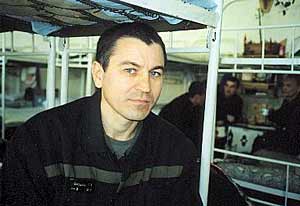Bart Staes, member of the European Parliament and chairman of the Delegation to EU-Russia Parliamentary Co-operation Committee intends to visit the imprisoned journalist Grigory Pasko.
Bart Staes, who represents the Group of the Greens/European Free Alliance in the European Parliament, has applied to the Russian Ministry of Justice to visit Grigory Pasko in the labour camp in Ussyriysk in the Russian Far East.
The Belgian Europarl-member, who has been instrumental in the European Parliament’s adoption of two resolutions denouncing the treason conviction of the journalist and environmentalist, told Bellona Web that there are a number of reasons why he has engaged himself in the case of Grigory Pasko.
Nuclear heritage
– Freedom of press and freedom of speech are among the most important characteristics of democracy, said Mr. Staes, who sees clear parallels between the Pasko-case and the case of Aleksandr Nikitin who a couple of years ago was acquitted on similar charges as those Pasko was convicted of.
Bart Staes added that the Nikitin-case made it clear that the nuclear heritage of the Soviet Union contains a possible environmental disaster, and only through co-operation the society can deal with this problem. – Through the work of Nikitin and Bellona the international community has been able to raise money in order to clean up in the sins of the past, he said.
– The Pasko-case is for the Far East, the same as the Nikitin-case was for the Kola Peninsula. That is why I want to visit him, said Mr. Staes, stressing that the Russian Federation should constructively approach Paskos actions and initiate co-operation in order to solve the nuclear problems in the Far East.
Parole hearing coming up
Staes request was forwarded to the Russian Justice Ministry just before Christmas. If he gets positive response Mr. Staes hopes to be able to visit Grigory Pasko in January.
If the Justice department bureaucrats do not get too involved in celebrating the Russian Christmas and New Year, but handles Mr. Staes request speedily, he may reach the town of Ussuryisk, 100 km Northwest of Vladivostok just in time to attend Paskos parole hearing. This hearing has been preliminary scheduled to January 13, 2003 at Ussuryisks municipal Court.
*****
Grigory Pasko who worked as an investigative reporter for the newspaper of the Russian Pacific Fleet was arrested on November 20, 1997 and charged with treason through espionage. He was acquitted of these charges by the Pacific Fleet Court in Vladivostok on July 20, 1999, but sentenced to a three-year imprisonment for ‘abuse of his official position’ although he was not charged with that crime, and released on a general amnesty.
After both sides had appealed, the Supreme Court cancelled the verdict in November 2000 and sent the case back for a new trial at the Pacific Fleet Court. The re-trial started on July 11, 2001 and ended on December 25, with Pasko being convicted to four years. The verdict was again appealed by both sides. On June 25, 2002 the Military Supreme Court confirmed Pasko’s four-year sentence. Pasko was transferred to a labour camp in the Russian Far East on September 10, 2002. His release is scheduled for April 25, 2004.




